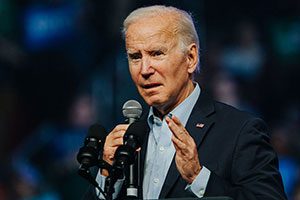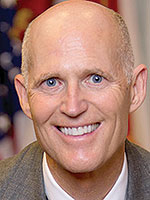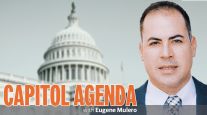Senior Reporter
Biden, Democrats Highlight Infrastructure Law Prior to Midterms

[Stay on top of transportation news: Get TTNews in your inbox.]
Leading up to Election Day on Nov. 8, President Joe Biden has traveled around the country to remind constituents of the Infrastructure Investment and Jobs Act’s potential benefits on matters related to broadband internet, electric vehicles and supply chain connectivity.
Infrastructure-centric investments are likely to boost the workforce across various sectors, the president and his senior staff repeatedly have insisted ahead of the midterms. The $1 trillion law, enacted nearly a year ago, has cemented its place as a centerpiece of the White House’s legislative achievements during Biden’s first two years in office.
“I signed the bipartisan infrastructure law, the most significant investment in our nation’s infrastructure," Biden said Nov. 3 at a campaign event in San Diego.
Later in his address, he added, "What we’re talking about is we have, literally, a great deal of money to make ours a more modern infrastructure."

President Joe Biden, shown during a campaign rally in Philadelphia. (Michelle Gustafson/Transport Topics)
To highlight the IIJA’s workforce programs, the White House recently released guidance meant to help stakeholders access funds for recruitment and retention efforts. Specifically, the “Advancing Equitable Workforce Development for Infrastructure Jobs,” aims to spotlight equitable workforce development for careers throughout the infrastructure sector. “The guide is intended for cross-sector stakeholders, including those who are directly responsible for deploying bipartisan infrastructure law funding and those who are investing in and implementing workforce development strategies and programs,” according to the White House.
“The bipartisan infrastructure law expands the Department of Transportation’s on-the-job training program, which helps develop the capacity of the current and future highway construction industry workforce by providing the development and diversity of skilled labor,” per the report.
Republicans, meanwhile, vying for leadership takeovers in the U.S. House and Senate, continue to criticize Biden administration policies without focusing much on the bipartisan infrastructure law. Specifically, most of the GOP blames the White House for prices at the grocery store and at the gas station.

Scott
“Americans are experiencing some of the highest inflation in their lifetime with no end in sight. And just like Joe Biden, the failed liberal politicians in Washington and media elites in New York and [Washington] D.C. are happy to look the other way as American families suffer every day due to this president’s failures,” said Sen. Rick Scott (R-Fla.), a member of the Commerce Committee with jurisdiction on trucking affairs. Scott is chairman of the National Republican Senatorial Committee.
“Record-breaking inflation, sky-high mortgage rates, horribly low labor participation, increasingly burdensome government regulation, rising energy costs,” Scott went on, “it’s all the result of Joe Biden’s war on American workers, our energy independence and the innovation that makes our country great.”
The infrastructure law was enacted Nov. 15, 2021. Or to quote James Austin Johnson as Biden on “Saturday Night Live” Nov. 5, “I passed that big [expletive] infrastructure bill. Remember that?”
The Week Ahead (all times Eastern)
Nov. 8: Election Day
Freight Corridor
An examination of the native lands.
Legislative Docket
Congressional transportation leaders recently raised concerns over the Biden administration’s temporary waiver of the Jones Act during emergency relief efforts in Puerto Rico. At a time when Congress and the White House are focused on improving the flow of freight nationwide, the lawmakers argued waiving the law could weaken the domestic maritime supply chain.

Mayorkas
“These waivers were unlawful, unnecessary and in direct contradiction to the government’s long-standing expressed interest in protecting American industry,” Sen. Roger Wicker (R-Miss.) wrote Homeland Security Secretary Alejandro Mayorkas on Oct. 28. Wicker is ranking member on the Commerce Committee. The bipartisan leadership of the House Transportation and Infrastructure Committee agreed with Wicker’s sentiment. Committee Chairman Peter DeFazio (D-Ore.), ranking member Rep. Sam Graves (R-Mo.), as well as their colleagues, questioned the administration’s move.
“We write to express our concerns and disappointment with your recent decision to grant Jones Act waivers for the delivery of fuel to Puerto Rico including to allow the delivery of diesel that was sourced from the mainland United States by British Petroleum Products North America to Puerto Rico on a foreign vessel,” the House lawmakers wrote to Mayorkas and Transportation Secretary Pete Buttigieg.
#ICYMI: To address Puerto Rico’s needs as they continue to recover from #Fiona, @SecMayorkas has approved a temporary & targeted Jones Act Waiver regarding liquified natural gas. https://t.co/GBxItXuulX — Homeland Security (@DHSgov) October 17, 2022
On Sept. 28, Mayorkas announced the department’s approval of a Jones Act waiver. The waiver, the secretary indicated, served as an aspect of Puerto Rico’s emergency response soon after Hurricane Fiona. The secretary explained: “In response to urgent and immediate needs of the Puerto Rican people in the aftermath of Hurricane Fiona, I have approved a temporary and targeted Jones Act waiver to ensure that the people of Puerto Rico have sufficient diesel to run generators needed for electricity and the functioning of critical facilities as they recover from Hurricane Fiona.”
Midterms ’22

OpenSecrets, relying on a review of federal records of political action committees and individual contributions, has ranked the top five contributors in the transportation sector for the 2021-22 election cycle. They were Boeing Co. at $2.8 million, UPS Inc. at $2.1 million, Viking Yachts at $2.1 million, National Auto Dealers Association at $2 million, and FedEx Corp. at $1.8 million.
“Even though their issues may not be front-and-center, the transportation sector still holds considerable financial clout,” according to a summary the election watchdog group posted on OpenSecrets.org. “In 2018, the sector gave more than $68 million in contributions, 70% going to Republicans. Generally, the sector heavily favors conservative causes, never dropping below 60% of donations since 1994. In 2016, the sector hit a new contribution high, giving more than $95 million in the presidential cycle.”
Favorite Video
The Donald is hinting he’ll soon be back on the campaign trail.
Favorite Tweet
Some people find themselves on the road again.
Buttigieg will be campaigning for Democrats in Michigan, New Hampshire and Nevada down the homestretch. https://t.co/lztZ2sAuIb pic.twitter.com/o8JAbhHAUt — Adam Wren (@adamwren) November 4, 2022
The Last Word
The Clean Water Act is the foundation of protecting our way of life.
Rep. Grace Napolitano (D-Calif.) on Oct. 18

We publish Mondays when Congress is in session. We also are publishing weekly during the 2022 midterm elections. See previous installments of Capitol Agenda here. Email emulero@ttnews.com with tips. Follow us @eugenemulero and @transporttopics.
Want more news? Listen to today's daily briefing below or go here for more info:


